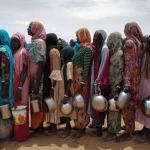On 28 January, delegations participating in the Iran Nuclear Negotiations in Vienna announced pausing the eighth round to head back to their capitals to receive “political decisions”. This appeared to be an indication that the negotiations had reached a decisive stage that requires decisions exceeding the powers of the negotiating delegations, primarily concerned with the technical side of the agreement. Some interpretations went further, suggesting that the delegations succeeded in settling the outstanding differences and the undecided issues that were demonstrative of the divergent positions on the main negotiated issues.
Perhaps a settlement of disputes cannot be ruled out, particularly all the involved parties, including Iran, speak of the progress made in negotiations. However, Iran was simultaneously keen to send the message that negotiations were not over yet and that the consensus reached isn’t sufficient as it fails to meet its conditions. A notable announcement in this respect came from the Secretary of Iran’s Supreme National Security Council, Ali Shamkhani, who tweeted on 6 February, “Despite limited progress in the Vienna Talks, we are still far from achieving the necessary balance in the commitments of the parties.”
Largely, this statement reflects Iran’s approach to the Vienna negotiations. Iran wants to reach an agreement, but just not at any price. It seeks negotiating an agreement that assimilates its reservations about the current agreement and ensures it experiences economic returns before honoring its commitments.
A Crisis of Mistrust
Arguably, the main obstacle that raises Iran’s concerns about any potential nuclear agreement is its mistrust towards some of the involved parties. Trump’s administration abandonment of the Iran Nuclear Deal on 8 May 2018 and its imposition of new sanctions on Iran on 7 August is quite fresh in Iran’s memory. Iran doesn’t rule out a replication of this scenario if such potential agreement is reached.
On that basis, Iran still wants to obtain guarantees that the US withdrawal scenario will not be repeated again, which the current US administration fails to offer assurances about. What’s more, Tehran may simultaneously seek to get guarantees that European countries will not respond to US sanctions in the event that Washington takes such a step again. More precisely, Iran’s mistrust crisis is not limited to the United States but extends to European countries, whom Iran criticized for their failure to honor their commitments under the nuclear agreement and operationalize the INSTEX mechanism for trade with Iran, due to pressures from the former US administration.
Iran’s focus on guarantees was clearly evidenced in statements of Iranian Foreign Minister Hossein Amirabdollahian, who said on 5 February, “What the Iranian negotiating team is to ensure guarantees at the political, legal and economic levels. Agreements have been achieved regarding some guarantees, but the Iranian negotiating delegation is still trying seriously to receive tangible assurances from the Western sides to ensure guarantees of their commitment to the undertakings under the Vienna deal.”
Primarily, this means that Iran will not probably rush to compromise a settlement that does not assimilate its reservations. Rather, it will seek to obtain political, legal, and economic guarantees as has been reflected in statements of its foreign minister. Therefore, it is not only about lifting sanctions but ensuring the permanence of this measure, i.e. ensuring sanctions will be lifted and shall continue to be lifted regardless of who takes power in the United States.
Uranium Transport
Unquestionably, what increases Iran’s concerns of the potential deal is that it will be required to transfer the uranium enriched above 3.67 percent (the enrichment level provided for in the current agreement), i.e. uranium enriched to up to 20 and 60 percent. This shall also apply to advanced centrifuges that Iran has produced and used for enrichment, rather than its first generation IR1 centrifuge machines (provided for in the agreement as well).
As such, the problem is bigger for Iran. Iran fears that it would conclude the agreement, then a new US administration –or even the current one at a later stage– come to decide to withdraw from the deal. In such case, Iran would have given up the important leverage it uses in the current negotiations, i.e. continuation of its nuclear activities at this scale, bringing it closer to the “nuclear threshold,” or, more precisely, helping it reduce the timeframe needed for possessing a nuclear bomb.
That is why Tehran showed no interest in the decision of Joe Biden’s administration, on 5 February, stipulating granting exemptions that allow countries, particularly Russia, China, and Britain, to cooperate with Iran on its nuclear program for peaceful purposes, especially with regard to the Tehran Research Reactor and Iran’s Arak Nuclear Complex, without being subjected to US sanctions, as these same exemptions have been put to an end by Trump’s administration as part of its “maximum pressure” campaign against Iran, launched after the US withdrawal from the nuclear agreement.
For Tehran, this step does not represent a “concession” on the part of the United States but rather an attempt to facilitate negotiations related to the transfer of uranium and nuclear equipment (enriched uranium to up to 3.67 percent and advanced centrifuges) abroad, something that has been hard to do so while sanctions exist.
Iran has begun to put emphasis on the idea of “balancing” as has been stated by Shamkhani, which implies that the agreement shall achieve balance between the economic and technological returns Iran gets and the concessions it will make, not only with regard to adhering to 3.67 uranium enrichment level, the use of IR1 centrifuge machines, and restricting enrichment operations to Natanz Fuel Enrichment Plant (Iran started enriching uranium in the Fordow Enrichment Plant the context of reducing its nuclear commitments in response to US sanctions), but also with regard to the transfer of all advanced nuclear materials and equipment.
This may be the starting point for the upcoming phase of negotiations, a phase that will be decisive in answering the bigger question about whether or not a new agreement could be reached, putting an end to the current crisis.













